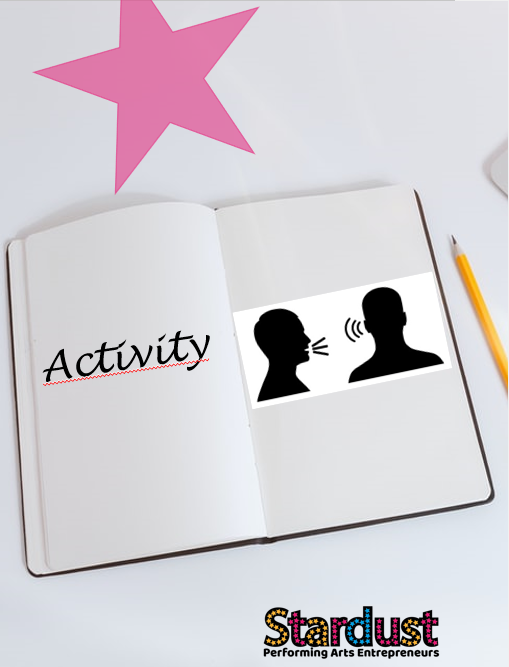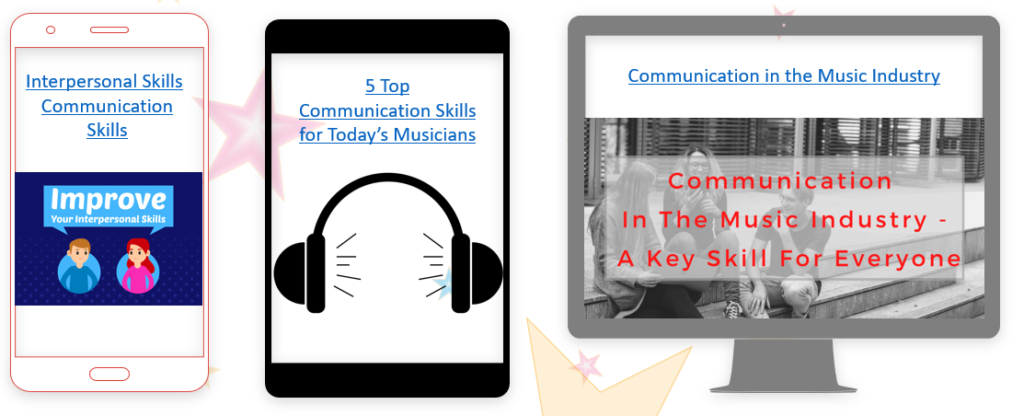
Module 2
"Communications Skills for Career Success"
"Communications Skills for Career Success"
Aim
The purpose of this module is to provide musicians with the necessary knowledge about the communication process and characteristics, as well as to practice the necessary skills to develop an efficient communication.
By the end of this module, you should be able to...
Knowledge
- Identify the main aspects that take place and influence the communication process.
- Understand the importance of the three components of communication: verbal, non-verbal and paraverbal.
Skills
- Develop their own potential to became good communicators.
- Produce impact communications in their professional context.
Attitudes
- Acquire a positive attitude towards communication situations empowering their self-confidence.
Key-concepts
Communication
Communication is the act of transferring information from one place, person or group to another.
Every communication involves (at least) one sender, a message and a recipient. This may sound simple, but it is actually a very complex subject.
Communication is more than simply the transmission of information. The term requires an element of success in transmitting or imparting a message, whether information, ideas, or emotions.
The transmission of the message from sender to recipient can be affected by a huge range of things. These include our emotions, the cultural situation, the medium used to communicate, and even our location. The complexity is why good communication skills are considered so desirable. Accurate, effective and unambiguous communication is extremely hard to achieve.
Interpersonal Skills
Being able to communicate effectively is perhaps the most important of all life skills. It is what enables us to pass information to other people, and to understand what is said to us.
Communication skills are needed in almost all aspects of life. Developing your communication skills can help all aspects of your life, from your professional life to social gatherings and everything in between.
The ability to communicate information accurately, clearly and as intended, is a vital life skill and something that should not be overlooked.
Communication barriers
There are many reasons why interpersonal communications may fail. There are many language, psychological, physiological, physical and attitudinal barriers to communication.
Skilled communicators also need to be aware of the barriers to effective communication. There are many barriers that exist when communicating and these may occur at any stage in the communication process. Effective communication involves overcoming these barriers and conveying a clear and concise message.
Some common Communication Barriers
- Language Barriers
- Psychological Barriers
- Physiological Barriers
- Physical Barriers
- Attitudinal Barriers
How can musicians overcome time management difficulties?
Active Listening
It means fully concentrating on what is being said rather than just ‘hearing’ the message of the speaker. Active listening involves listening with all senses. As well as giving full attention to the speaker
Use Simple Language
It’s important to remember the audience that you’re speaking to, and use language that can be easily understood.
Give Constructive Feedback
While the feedback that you give the speaker/sender may occasionally be negative, it is important that it be constructive in nature.
Case Study:
Developing 21st Century Skills Through Music
Playing in the Conductorless Orchestra Helped Students Develop Communication Skills
Listener and Talker Activity
The “Listener and Talker” activity is a good activity for showing the importance of active listening and giving participants a chance to practice their skills.
Divide the group into pairs, with one partner assigned to the talker role and the other assigned to the listener role. The talker’s job is to describe what he or she wants from a vacation without specifying a destination. The listener’s job is to listen attentively to what is being said (and what is not being said) and to demonstrate their listening through their behavior.
After a few minutes of active listening, the listener should summarize the three or main criteria the talker is considering when it comes to enjoying their vacation. Finally, the listener should try to sell the talker on a destination for their vacation. After a quick debrief on how well the listener listened, the two should switch roles and try the exercise again.
This exercise gives each participant a chance to practice talking about their wants and needs, as well as an opportunity to engage in active listening and use the knowledge they gained to understand and relate to the speaker.
Communication Tips for Musicians
ACTIVE LISTENING
Active listening means paying close attention to who you’re communicating with by engaging with them, asking questions and rephrasing. Practicing active listening can build respect with your colleagues and increase understanding. As you actively listen, focus on the speaker, avoiding distractions like cell phones, laptops or other projects, and by preparing questions, comments or ideas to thoughtfully respond.
Improve your active listening abilities by paying attention to other people’s facial expressions, body language and tone. Instead of preparing what you will say, focus on what the other person is saying and how they are saying it. If you need to clarify something, ask followup questions or rephrase what they’ve said to confirm that you understood them correctly.
COMMUNICATION METHOD
Using the right way to communicate is an important skill. There are benefits and disadvantages to talking through emails, letters, phone calls, in-person meetings or instant messages. Communicating is better when you consider your audience, what information you want to share and the best way to share it.
For example, if you are communicating about a potential job, it may be better to send a formal email or call them on the phone. With other musicians, you may find it’s easier to communicate complex information in person or via a video conference than by email. Building remote friendships is easier when you can speak through instant messages.
FRIENDLINESS
Friendly traits like honesty and kindness can help foster trust and understanding when communicating. Try to communicate with a positive attitude, keep an open mind and ask questions to help you understand where they’re coming from.
Small gestures such as asking someone how they’re doing, smiling as they speak or offering praise for work well done can help you foster productive relationships with colleagues and managers.
You can practice friendliness by remembering small, thoughtful details about your colleagues or past conversations.
Communication Tips for Musicians
CONFIDENCE
People are more likely to respond to ideas that are presented with confidence. There are many ways to appear confident, including making eye contact when you’re addressing someone, sitting up straight with your shoulders open and preparing ahead of time so your thoughts are polished and you’re able to answer any questions.
SHARING FEEDBACK
Strong communicators can accept critical feedback and provide constructive input to others. Feedback should answer questions, provide solutions or help strengthen the project or topic at hand. Providing and accepting feedback is an essential skill, as it can help both you and the people around you make meaningful improvements to their work and their professional development.
EMPATHY
Having empathy means that you can not only understand, but also share in the emotions of others.
This communication skill is important in both team and one-on-one settings. In both cases, you will need to understand other people’s emotions and select an appropriate response.
RESPECT
A key aspect of respect is knowing when to initiate communication and respond. In a team or group setting, allowing others to speak without interruption is seen as a necessary communication skill tied to respectfulness.
Respectfully communicating also means using your time with someone else wisely, staying on topic, asking clear questions and responding fully to any questions you’ve been asked.
NONVERBAL CUES
A great deal of communication happens through nonverbal cues such as body language, facial expressions and eye contact. When you’re listening to someone, you should be paying attention to what they’re saying as well as their nonverbal language. By the same measure, you should be conscious of your own body language when you’re communicating to ensure you’re sending appropriate cues to others.
VOLUME AND CLARITY
When you’re speaking, it’s important to be clear and audible. Adjusting your speaking voice so you can be heard in a variety of settings is a skill, and it’s critical to communicating effectively. Another aspect of verbal communication is vocalics and tonality. They can be effective in communicating emotions and offer your audience insights into how your message should be interpreted (whether you realize it or not).
Communication Skills for Musicians
Action Plan
THINK FIRST, SPEAK SECOND
Taking a few seconds to think about what you’re going to say first will help you articulate your answer in a more effective way. How many times do we say the first thing that comes into our head and end up confusing people?
you’ll be amazed at how more influential you can be by trying this technique.
FOCUS ON REALLY LISTENING
The best communicators are those who are able to listen patiently without interrupting the person who is speaking. By carefully listening to what people are saying, you’ll be able to craft a response that will help resolve situations and give confidence in your ability.
ADAPT YOUR COMMUNICATION
Adjust the way you talk depending on who your audience is (colleagues, manager, fans, etc.).
This is something that we actually do naturally but with a little practice, you’ll be able to influence the outcome of situations more effectively.



